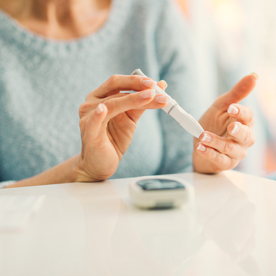
According to the UK charity, Verity, PCOS affects as many as one in five womeni. For some, PCOS symptoms can be relatively mild symptoms; others, however, may find the condition has a hugely pervasive impact on their daily lives. With symptoms like irregular periods, obesity, insulin resistance, excess facial and body hair and oily skin or acne, PCOS can also lead to mental health issues.
While there’s no cure for PCOS, the good news is there are countless management tools available to help with the symptoms. One of the simplest and most cost-effective treatments for certain PCOS symptoms is increasing your intake of vitamin D and calcium. Here, we uncover how these nutritional powerhouses could help to ease PCOS symptoms.
What do calcium and vitamin D do in the body?

Most of us are familiar with the notion that calcium is an important mineral for building strong bones and teeth. Beyond this, calcium is also needed for regulating muscle contractions (including the heart muscle) and ensuring blood clots normally.
Vitamin D, on the other hand, is a fat-soluble vitamin that supports the proper absorption and utilisation of calcium. Vitamin D, therefore, is also critically essential for healthy teeth and bones.
Crucially, for women with PCOS, vitamin D has also been linked to improved fertility in those having IVF treatment. There’s evidence to suggest women with sufficient vitamin D levels are significantly more likely to become pregnant following fertility treatmentii.
Low vitamin D and PCOS
Experts purport many people in the UK are deficient in vitamin D. According to Patient, about one in five adults and around one in five children in the UK have low vitamin D levelsiii.
Generally speaking, more people are vitamin D deficient in the winter and spring due to lower levels of sunshine (the body synthesises vitamin D from direct sunlight). Currently, the UK Department of Health recommends a daily 10mcg vitamin D supplement throughout the year, especially for those who mainly reside indoors. Learn more about vitamin D guidelines from the NHS here.
If you have PCOS, however, you may be more likely to experience a vitamin D deficiency. In one study, researchers found 44 per cent of women with PCOS were severely vitamin D deficient compared with 11.2 per cent of those without PCOSiv.
It’s not yet clear why this is the case. One thing experts can agree on is that vitamin D is important for hormone production – and PCOS is caused by an underlying and complex hormone imbalance. Another study substantiating the claim that vitamin D deficiency is widespread among women with PCOS found low calcium levels were rife amongst this group, toov.
For the general population, a vitamin D deficiency can manifest in several ways: fatigue, tiredness, hair loss, bone density loss, low mood, and impaired wound healing. But, for women with PCOS, low levels of vitamin D may lead to the aforementioned symptoms as well as infertility, insulin resistance, increased levels of androgens, and inflammation.
Vitamin D, calcium and PCOS symptoms
Increasing your intake of vitamin D and calcium is known to benefit the following PCOS symptoms.
Infertility
Menstrual irregularities – irregular, infrequent or no periods – often characterise PCOS. For some women, this can affect fertility and make it harder to get pregnant. Interestingly, one study suggests women with PCOS who are vitamin D deficient when starting fertility treatments are 40 per cent less like to become pregnantvi.
Another small-scale study conducted by researchers at Columbia University investigated 13 women with PCOS, four of whom were having no periods at all and nine of whom were having irregular or infrequent periods. After taking vitamin D and calcium treatments for two months, seven of the women were having normal periods and two even became pregnantvii.
Several other studies investigating women with PCOS measured the effect of taking vitamin D and calcium alongside a drug called metformin, which is commonly used prescribe to manage type-2 diabetes. Increasingly, however, metformin is employed to mitigate PCOS-related fertility problems. A number of these trials suggest taking metformin with vitamin D and calcium may be more effective at treating PCOS-based infertility than metformin aloneviii.
Take a look at more of our advice for improving fertility in PCOS women.
Insulin resistance
Insulin resistance is the result of your body responding abnormally to the hormone, insulin, which can cause high blood insulin levels and potentially lead to type 2 diabetes. Insulin resistance is often the by-product of obesity, which is another comorbidity of PCOS. Notably, up to 70 per cent of women with PCOS are thought to be insulin resistantx.
There’s some evidence that vitamin D is linked with insulin resistance, with one study reporting obese people exhibiting a vitamin D deficiency may be 12 times more likely experience insulin resistance than obese people with healthy vitamin D levelsviii. Researchers have also found using vitamin D replacement therapy may have a beneficial effect on insulin resistance in obese women with PCOSix.
By understanding the link between PCOS and diabetes, you can better equip yourself to manage the condition through lifestyle change and supplementation.
Hyperandrogenemia
This term relates to high levels of androgens (or ‘male’ hormones, like testosterone) in the body. Hyperandrogenemia is another common feature of PCOS known to increase the risk irregular periods, excess facial and body hair, thinning scalp hair and oily skin or acne.
Yet, studies have found that vitamin D treatment – with and without calcium – may help reduce androgen levels in women with PCOSxi. It’s worth mentioning there are many other ways to manage any excess hair growth that may occur as a result of PCOS.
Inflammation
Beyond this, some experts believe PCOS is related to low-grade inflammation in the bodyxii. This reason for this remains unclear, but its purported to be insulin resistance. One study looked at the effects of taking different doses of vitamin D supplements in women with PCOS. It found taking a higher amount of vitamin D (100mcg) a day may be more effective at lowering markers of inflammation than a lower level of the daily supplementxiii. The same study found taking the higher dose of vitamin D may be more beneficial in lowering testosterone levels in PCOS sufferers too.
Another study investigated vitamin D and calcium supplementation in women with PCOS who were overweight and vitamin D deficient. It revealed taking both supplements for eight weeks had a positive impact on inflammation markers compared to the placeboxiv.
How to boost your levels of both vitamins
If you have PCOS there’s a good chance you will also have poor levels of vitamin D and calcium. Fortunately, there are many ways to restore your nutrient stores to a healthy equilibrium.
The primary source of vitamin D is direct sunlight. According to the NHS, most people can metabolise enough vitamin D from short bursts of direct, unprotected sun exposure on their forearms, hands, or lower legs from late March to the end of September. It’s hard to discern exactly how much time you ought to spend in the sun; it depends on your skin colour and how much skin you’re exposing.
Besides sunlight, you can also get vitamin D from food sources. However, it’s important to caveat this can be challenging because vitamin D is only found in a small number of foods, including oily fish, liver, eggs, red meat, and fortified foods, like breakfast cereals.
The most convenient way to get meet your body’s needs, especially if you have PCOS, is with a high-strength vitamin D supplement. Government guidelines recommend a 10mcg-a-day supplement. But if you decide to take a higher dose, 100mcg a day is considered the safe limit. Before taking any supplement, always speak to your GP; the recommended amount can vary from person to person.
Calcium, on the other hand, is more prevalent in food sources than vitamin D. You can find calcium in abundance in dairy, green leafy vegetables, soya foods (including tofu), nuts, and fish (sardines and pilchards), and products made with fortified flour.
According to the NHS, adults need 700mg of calcium a day. Some people may not enough from their diet, especially if they don’t eat dairy, which may be the case for women with PCOS who are trying to lose weight. Again, it may be worth considering a supplement (the NHS considers 1500mg a day to be the safe upper limit).
Both calcium and vitamin D supplements are available as single supplements or combined in multivitamin and mineral formulations on our website.
For more information on PCOS and advice, explore our PCOS hub.
References:
-
Verity. (2017). [Date accessed, 03/04/2018.] Available online: https://www.verity-pcos.org.uk/
-
Garbedian, K., Boggild, M., Moody, J., Liu, K.E. (2013 Jun 28). Effect of vitamin D status on clinical pregnancy rates following in vitro fertilization. CMAJ Open. 1(2):E77-82. Available online: http://cmajopen.ca/content/1/2/E77.abstract
-
Harding, M. (May, 2017). Vitamin D deficiency Patient Info. [Date accessed, 03/04/2018.] Available online: https://patient.info/health/osteoporosis-leaflet/vitamin-d-deficiency
-
Li, H.W., Brereton, R.E., Anderson, R.A., Wallace, A.M., Ho, C.K. (2011 Oct). Vitamin D deficiency is common and associated with metabolic risk factors in patients with polycystic ovary syndrome. Metabolism. 60(10):1475-81. Available online: https://www.ncbi.nlm.nih.gov/pubmed/21550088
-
Subashree, I., Valvekar, U.R., Prasad, G. (2017 Sep). Study of serum calcium and vitamin D levels with hormonal profile along with biochemical profile in women with polycystic ovary syndrome. Int J Reprod Contracept Obstet Gynecol. 6(0):4075 4080. Available online: http://www.ijrcog.org/index.php/ijrcog/article/view/3357
-
Butts, S., et al. (2017). Vitamin D May be Key for Pregnant Women with Polycystic Ovary Syndrome. Presented at the annual American Society for Reproductive Medicine Scientific Congress & Expo, November 2017. Available online: https://www.pennmedicine.org/news/news-releases/2017/november/vitamin-d-may-be-key-for-pregnant-women-with-polycystic-ovary-syndrome
-
Thys-Jacobs, S., et al. (1999 Jun). Vitamin D and calcium dysregulation in the polycystic ovarian syndrome. Steroids. 64(6):430-5. Available online: https://www.ncbi.nlm.nih.gov/pubmed/10433180
-
Rashidi, B., Haghollahi, F., Shariat, M., Zeyerii, F. (2009 Jun). The effects of calcium-vitamin D and metformin on polycystic ovary syndrome: a pilot study. Taiwan J Obstet Gynecol. 48(2):142-7. Available online: https://www.ncbi.nlm.nih.gov/pubmed/19574176
Tehrani, H.G., Mostajeran, F., Shahsavari, S. (2014 Sep). The effect of calcium and vitamin D supplementation on menstrual cycle, body mass index and hyperandrogenism state of women with poly cystic ovarian syndrome. J Res Med Sci. 19(9): 875–880. Available online: https://www.ncbi.nlm.nih.gov/pmc/articles/PMC4268197/
Firouzabadi, R.D. (2012 May). Therapeutic effects of calcium & vitamin D supplementation in women with PCOS. Complement Ther Clin Pract. 18(2):85-8. Available online: https://www.ncbi.nlm.nih.gov/pubmed/22500844/ -
Marshall J.C., Dunaif A. (2012 Jan). All Women With PCOS Should Be Treated For Insulin Resistance. Fertil Steril. 97(1); 18-22. Available online: https://www.ncbi.nlm.nih.gov/pmc/articles/PMC3277302/
-
Kabadi, S.M., Lee, B.K., Liu, L. (2012 Oct). Joint effects of obesity and vitamin D insufficiency on insulin resistance and type 2 diabetes: results from the NHANES 2001-2006. Diabetes Care. 35(10):2048-54. Available online: https://www.ncbi.nlm.nih.gov/pubmed/22751957
-
Selimoglu, H., et al. (2010). The effect of vitamin D replacement therapy on insulin resistance and androgen levels in women with polycystic ovary syndrome. J of Endo Invest. April 2010, Volume 33, Issue 4, pp 234–238. Available online: https://link.springer.com/article/10.1007/BF03345785
-
Azadi-Yazdis, M., Nadjarzade, A., Khosravi-Boroujeni, H. (2017 Mar). The Effect of Vitamin D Supplementation on the Androgenic Profile in Patients with Polycystic Ovary Syndrome: A Systematic Review and Meta-Analysis of Clinical Trials. Horm Metab Res. 49(3):174-179. Available online: https://www.ncbi.nlm.nih.gov/pubmed/28351084
Pal, L., et al. (2012 Dec). Therapeutic implications of vitamin D and calcium in overweight women with polycystic ovary syndrome. Gynecol Endocrinol. 28(12):965-8. Available online: https://www.ncbi.nlm.nih.gov/pubmed/22780885
Firouzabadi, R.D., et al. (2012 May). Therapeutic effects of calcium & vitamin D supplementation in women with PCOS. Complement Ther Clin Pract. 18(2):85-8. Available online: https://www.ncbi.nlm.nih.gov/pubmed/22500844 -
Deluba, A.J., Dokras, A (2012 Jan). Is PCOS an inflammatory process? Fertil Steril. 97(1):7-12. Available online: https://www.ncbi.nlm.nih.gov/pubmed/22192135
-
Jamilian, M., et al. (2017 Dec). Effect of Two Different Doses of Vitamin D Supplementation on Metabolic Profiles of Insulin-Resistant Patients with Polycystic Ovary Syndrome. Nutrients. 9(12): 1280. Available online: https://www.ncbi.nlm.nih.gov/pmc/articles/PMC5748731/
Related Posts?
Disclaimer: The information presented by Nature's Best is for informational purposes only. It is based on scientific studies (human, animal, or in vitro), clinical experience, or traditional usage as cited in each article. The results reported may not necessarily occur in all individuals. Self-treatment is not recommended for life-threatening conditions that require medical treatment under a doctor's care. For many of the conditions discussed, treatment with prescription or over the counter medication is also available. Consult your doctor, practitioner, and/or pharmacist for any health problem and before using any supplements or before making any changes in prescribed medications.

Olivia
Olivia Salter has always been an avid health nut. After graduating from the University of Bristol, she began working for a nutritional consultancy where she discovered her passion for all things wellness-related. There, she executed much of the company’s content marketing strategy and found her niche in health writing, publishing articles in Women’s Health, Mind Body Green, Thrive and Psychologies.
View More



